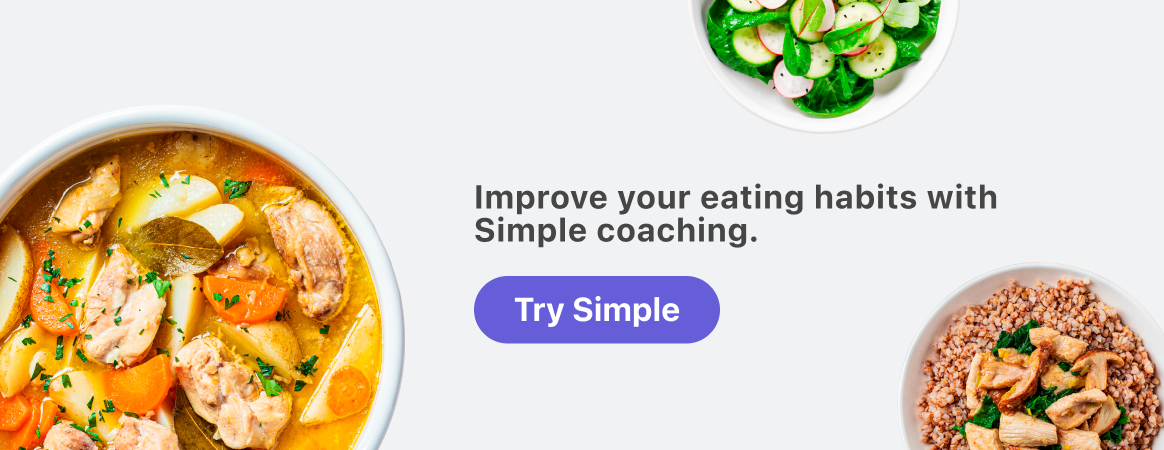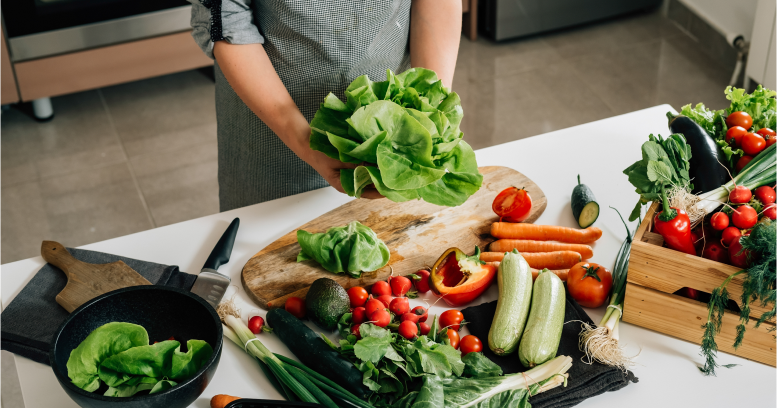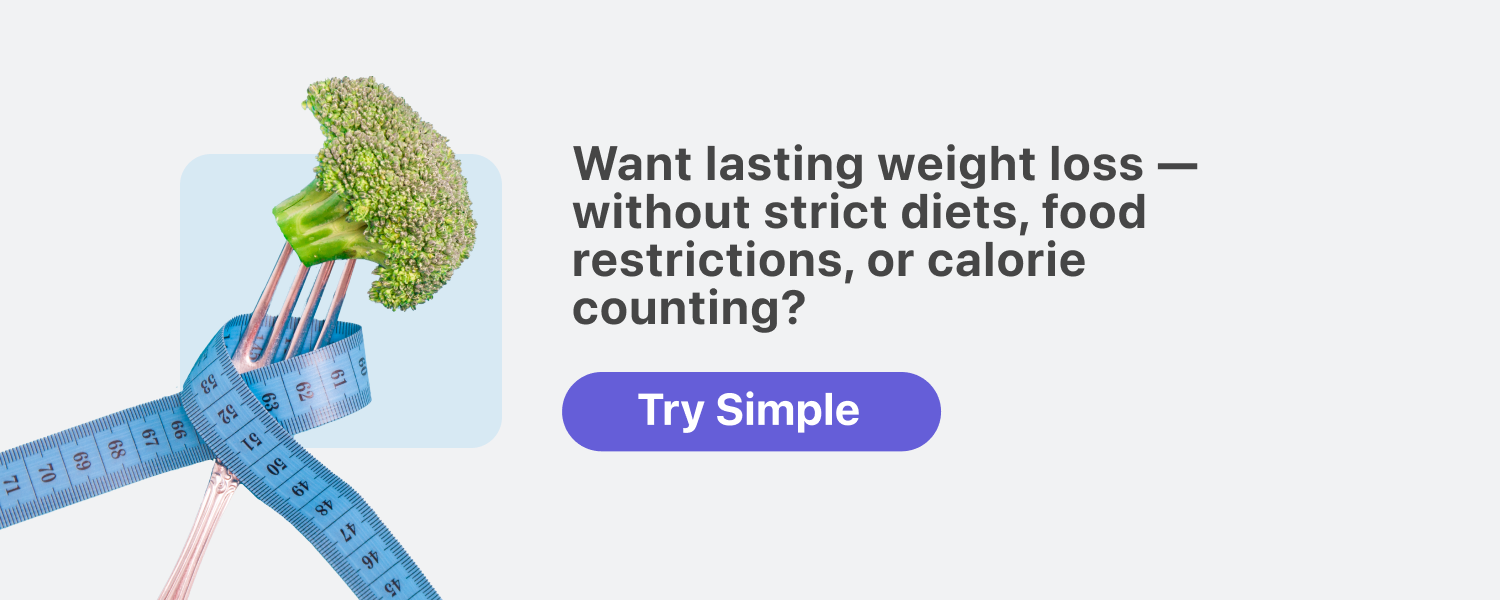Your Simple guide to clean and dirty fasting

No doubt you’ve heard of and maybe even tried intermittent fasting since it has numerous scientifically proven benefits. But during your fasting journey, have you come across terms like “clean” vs. “dirty” fasting and been left wondering what they mean? Don’t worry, we’re here to clear up any confusion!

Clean and dirty fasting are terms that refer to what breaks a fast. Some experts promote consuming only water during your fast, while others claim that low-calorie drinks, stevia, MCT oil, and even a little bit of coffee creamer are A-okay.
It’s hard to know what might be right for you, but that’s where we come in.
If you want a primer on how fasting works, check out our intermittent fasting for beginners article. Ready to give intermittent fasting a try? Check out our Simple quiz, and we’ll help you get started!

What is clean fasting?
Clean fasting is when you follow an intermittent fasting schedule and consume only water or non-caloric beverages like plain water, mineral water, sparkling water, black coffee, and black tea.
Sometimes, you’ll find information that says clean fasting must be calorie-free. But beverages like black coffee still contain five calories per cup. However, in body terms, those few calories are pretty irrelevant.
Water has no calories or nutrients (although mineral waters obviously contain minerals), while drinks like black coffee or tea contain only negligible amounts.
In these cases, neither water nor black coffee / tea have enough calories and/or carbohydrates to kick your body out of its fasted state, so it can continue its “metabolic switch” from burning carbs to burning fat as fuel.[1,2,3,4]
So what can you consume during a clean fasting window?

Water
Make sure to stay hydrated during a clean fast, and have lots of water — sparkling, mineral, or distilled are all good options.
However, if you are clean fasting, steer clear of additives like lemon slices, fruits, and herbs. They can add flavor to your water but eliminate the purpose of a “clean fast.”
Black coffee and tea
Black coffee and tea are also allowed during a clean fast because they don’t trigger an insulin response in your body, which would break you out of your fasting window.
Caffeine acts as a mild diuretic, which increases your urine production. In moderation, coffee probably won’t cause dehydration since it contains water, which will negate the diuretic effect. So, coffee can contribute to your daily fluid intake. However, it’s best to stick to about 1–2 cups a day, especially if you have any medical conditions (such as high blood pressure or a heart condition).
Drinking moderate amounts of black coffee during a clean fast is totally safe, but if you’re concerned about hydration, it may be a good idea to switch to decaf black coffee or choose herbal teas which are naturally caffeine-free, such as chamomile or hibiscus. Plain old water can also do the trick!
Logging your drinks in the Simple app can help you be sure whether you’re sticking to clean fasting or not. Take our Simple quiz to get your hands on our hydration tracker (as well as a fasting buddy). We’ll send you reminders to drink, so the only thing you’ll have to worry about is whether you want sparking or plain water during your clean fast.
Quick note: Be careful with “clean”
Words like “clean” and “dirty” can make it sound like some ways of doing things are “good” or “bad.”
At Simple, we want to take the moralizing out of eating (and fasting) habits and just focus on what works best for YOU — a real human living in the real world.
So, pay attention to any thoughts and feelings that come up for you when you consider your fasting path — and take the judgment out of whatever you choose!
What is “dirty” fasting?


Dirty fasting is when you consume foods or drinks that are under 50 calories during your fasting window — a noticeable but extremely small amount of energy.
Your fasting is dirty if, for instance, you add a bit of creamer to your coffee. Or sip on tasty bone broth. Or maybe you add zero-calorie sweeteners to your tea or drink zero-calorie soda.
You may notice a difference in how you feel if you choose:
- sweet foods with calories (such as honey, maple syrup, or a little sugar in your coffee)
- fatty foods with calories (such as high-fat cream or MCT oil)
What can you consume during a dirty fasting window?
Here is a list of foods and drinks you can consume during a dirty fasting window. If you want to try dirty fasting, add them to your beverages for some extra flavor.
- 1 tbsp. cream (30 calories, 0.5 g carbs)
- 1 tbsp. 2% cow’s milk (18 calories, 1 g of carbs)
- 2 tbsp. almond milk (10 calories, 1 g carbs)
- 1 tsp. honey (20 calories, 6 g carbs)
- 1 tbsp. maple syrup (17 calories, 14 g carbs)
- stevia (0 calories, 0 g carbs) and Splenda/sucralose (0 calories, 0 g carbs)
- 1 tsp. MCT oil (38 calories, 0 g carbs) *100% fat
- 1 cup bone broth (40 calories, 3 g carbs)
- water + juice of 1 lemon (14 calories, 0 g carbs)
- sugar-free chewing gum (0 calories, 0 g carbs)
Quick metric conversions:
- 1 tsp. = 5 ml
- 1 tbsp. = 15 ml
- 1 cup = 250 ml
Can dirty fasting be the reason you’re not losing weight?
Probably not. Weight loss usually depends on what you consume during your eating window and how much energy you consume throughout the day vs. what you use for daily living and activities.
Relatively speaking, very small amounts of calories are likely not the main contributor to a weight loss plateau.
Try using the Simple app to log your foods and drinks and get personalized insights that can help you identify where to make small changes that deliver a big impact. Get started today by taking our Simple quiz.
What are you fasting for?

Here’s an important point that often gets lost in the discussion of “clean” vs. “dirty” fasting:
What is YOUR reason for fasting?
Knowing what guides you personally can help you decide what works best for you.
Possible reason 1: Lower overall calorie intake.
Many people fast because it’s a simple way to eat less energy (from calories) overall.
And, as you’ll remember, to lose weight, we have to find ways to eat fewer calories than we burn.
In this case, the focus is just to consume less energy overall.
(Rather than being in ketosis or fasting in any particular way.)
Did you know?
Many “fasting” studies aren’t truly “fasting,” but rather very low calorie intakes.
For example, in many studies, people actually consumed calories during their fasting window, but very little — perhaps 200 to 300 calories.
In this case, drinks with a few calories (rather than zero) are no big deal.
If people are still consuming fewer calories than they burn over the course of a day, it’s completely OK.
Possible reason 2: Be in ketosis.
Ketosis is the physiological state where our bodies use fat almost exclusively for energy (in the form of ketone bodies).[1]
Our bodies start to move into this state around 8 to 12 hours after our last meal, depending on a few different factors (like how active we are).
Some people have the specific goal of being in ketosis.
In this case, drinks should ideally be zero calories.
Possible reason 3: Be truly fasted.
Here, the goal is to consume zero calories.
People might do this to:
- learn about hunger;
- have a clear break from eating; or
- explore the physiological experience of having no energy coming in at all.
They may also do this before medical appointments (such as lab tests) where the doctor has asked them to fast.
In this case, drinks should ideally be zero calories.
Artificial sweeteners like aspartame, sucralose (aka Splenda), acesulfame-K, and stevia are common ingredients in “sugarless” or “diet” foods and drinks like sugar-free chewing gum or soda. And whether they raise your blood sugar levels has been a hot topic of debate.
Most research suggests that they don’t, but there’s the occasional study that speculates that they could.[5,6] At this stage, though, we need more research to conclude whether it does raise your blood sugar levels.
Some people also find that sweeteners increase their appetite, while others find that the sweetness keeps their taste buds happy during a long fast and actually makes fasting easier.[7,8]
But that doesn’t mean artificial sweeteners add nutritional value. Other than replacing sugar-sweetened foods, artificial sweeteners don’t seem to have nutritional benefits.[9]
Keeping it real: the occasional diet soda is probably fine, and if it’s replacing a sugar-sweetened drink, it might be a better option. (Of course, water is even better, but … you knew that, right?)
It depends on why you’re fasting and what you want to get out of it.
“Dirty fasting” still provides some benefits, like reduced calorie intake and improved insulin sensitivity. Many people find that small “boosts,” like a bit of cream in their coffee, give them enough motivation to keep going.
However, other people find that “clean fasting” works better for them — for instance, they might like the simplicity of the guidelines or find that “all or nothing” works better for them than “a little something.”
Whatever you choose … it should be something that you can incorporate into your lifestyle and stick with sustainably.
Certain supplements and medications can contain calories or have metabolic effects that might interfere with fasting. Consult a healthcare professional if you’re unsure about taking these during fasting.

- Gershuni VM, Yan SL, Medici V. Nutritional Ketosis for Weight Management and Reversal of Metabolic Syndrome. Curr Nutr Rep. 2018 Sep;7(3):97–106.
- Mattson MP, Moehl K, Ghena N, Schmaedick M, Cheng A. Intermittent metabolic switching, neuroplasticity and brain health. Nat Rev Neurosci. 2018 Feb;19(2):63–80.
- Goodpaster BH, Sparks LM. Metabolic Flexibility in Health and Disease. Cell Metab. 2017 May 2;25(5):1027–36.
- Smith RL, Soeters MR, Wüst RCI, Houtkooper RH. Metabolic Flexibility as an Adaptation to Energy Resources and Requirements in Health and Disease. Endocr Rev. 2018 Aug 1;39(4):489–517.
- Ahmad SY, Friel JK, Mackay DS. Effect of sucralose and aspartame on glucose metabolism and gut hormones. Nutr Rev. 2020 Sep 1;78(9):725–46.
- Zhang R, Noronha JC, Khan TA, McGlynn N, Back S, Grant SM, et al. The Effect of Non-Nutritive Sweetened Beverages on Postprandial Glycemic and Endocrine Responses: A Systematic Review and Network Meta-Analysis. Nutrients [Internet]. 2023 Feb 20;15(4).
- Hall WL, Millward DJ, Rogers PJ, Morgan LM. Physiological mechanisms mediating aspartame-induced satiety. Physiol Behav. 2003 Apr;78(4-5):557–62.
- Iizuka K. Is the Use of Artificial Sweeteners Beneficial for Patients with Diabetes Mellitus? The Advantages and Disadvantages of Artificial Sweeteners. Nutrients [Internet]. 2022 Oct 22;14(21).
- Santos NC, de Araujo LM, De Luca Canto G, Guerra ENS, Coelho MS, Borin M de F. Metabolic effects of aspartame in adulthood: A systematic review and meta-analysis of randomized clinical trials. Crit Rev Food Sci Nutr. 2018;58(12):2068–81.
